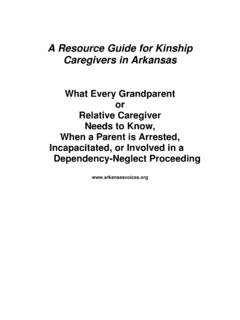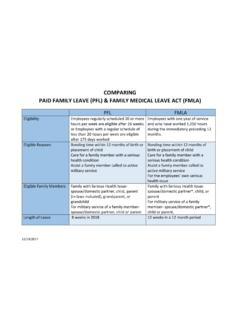Transcription of When a Grandparent Dies - Child Care Resources Inc.
1 Most kids lose a Grandparent at some point in their lives. A Grandparent 's illness and death can disrupt daily routines and send family emotions into high gear. Chil- dren who are too young to understand the complexities of what's going on, use their behavior to tell us - the adults in their life that they're having difficulty deal- ing with the change. But as we go through our own inner turmoil, we often tempo- when a Grandparent rarily and unavoidably neglect our children's emotional needs. Grandparents link us to our past. Whether they care for our children regularly, see them only at special visits, or communicate via cards, phone, or Internet, they play a unique role in our children's lives. How we as parents guide our youngsters through their grandparents' deaths becomes a hallmark for other important emo- tional events our children will experience as they grow up.
2 Equally important, their memories of Nana or Grampy offer them a legacy of their past and a richness of life experience that they will hold forever. Guidelines for Grieving Children are very impressionable. Your children will remember how you handled their grandparents' deaths; and, in the future, they will model their own grief on these teachable moments from childhood. To help you navigate this difficult period and provide your children with important coping skills, consider the following guide- lines: DO describe in simple terms what's going on. As a Grandparent 's health de- clines, prepare your children for the changes they are likely to see and experi- ence. For example, "Nana can no longer walk on her own so she uses a walker to help her" or "Have you noticed that Grampy sleeps a lot now? He takes lots of medicines that keep him comfortable, but make him sleepy.
3 ". DO take your children to visit the Grandparent in the hospital. Children, even those as young as 3 years, can benefit from this experience because the mys- tery and secrecy surrounding a serious illness are often more frightening than the reality. Just be sure to prepare her for what she will see and hear. For ex- ample, tell her if Grandma has a roommate or if she is likely to see Grandpa with an IV needle or a breathing tube. Talk about the unusual smells and sounds she may notice. And let her know how she should act during the visit: "Grampy will be tired, so he probably won't want to play, and he may want to rest quietly." If a Grandparent 's behavior, personality changes, or mood swings could confuse or frighten your Child , reconsider a visit. Instead, spend some time with your Child drawing pictures of Nana or making audiotapes of the songs and stories Grampy used to sing and tell.
4 DO find ways for your Child to help as a Grandparent 's health declines. This is critical. Even 2 1/2- or 3-year-olds like to be involved in helping. It makes them feel like an important part of the caring and giving process. (Continued on the back ). Promoting Healthy Social Behaviors in Child Care Centers Continued .. DO prepare your children for a Grandparent 's imminent death. If you have told them that Grandma's health is failing, they are likely to ask the inevitable but painful question, "Is my Nana going to die?" Although it may seem counterintui- tive, the best way to protect your children's emotional health is to share information that will affect them. Answer truth- fully ("Yes, I think that Nana will die soon"). Reassure your children that you will help them face this event and that you'll go through it together as a family.
5 Of course, exactly how and what you tell your children will depend on how old they are, how much they can understand, how they are when a Grandparent likely to react, and whether they have experienced similar losses before. DO find teachable moments from the experiences of friends or neighbors. Point out how the families returned to their normal routines after a Grandparent 's death. Children's television shows and movies often include themes that relate to illness and/or death. Watch with your children and discuss what happens, so when the inevitable occurs, it will be easier for them to understand and cope. DO express your own authentic grief in front of your children. It's good for them to see that it's okay to be sad. Then be sure to explain what you're feeling (sad, angry, exhausted) and reassure them that you are still there to care for them even as you mourn.
6 This is an important distinction that your children needs to hear often. DO encourage your children to participate in the memorial service, shivah, or other family ritual at the time of death if they are old enough to be able to make sense of the event. (A Child who can verbalize an understanding of what's going on "We are saying good-by to Nana" is probably ready to participate.) Be sure to explain in simple terms what's going to happen. If the Child is too young to understand, seems anxious or confused, or says that he or she doesn't want to go, leave the Child in the care of a familiar adult. DON'T assume that just because a Child is young, the illness or death of a Grandparent won't affect him or her. Your children watch,, listen, and learn from you. The information they overhear while you are talking to family, friends, or doctors (including when you're on the phone) can be confusing, frightening, and overwhelming.
7 DON'T overload your children with information. They will let you know what they need to know, how much, and when , if you simply listen to them. DON'T try to be the perfect parent. You are being called upon to be a son or daughter, a sibling, a caregiver, and a parent all at once during the most stress- ful of life's events. Try to be available to your children at family meals and bed- time, but don't hesitate to ask friends and relatives for help while you mourn. Adapted from Promoting Healthy Social Behaviors in Child Care Centers






